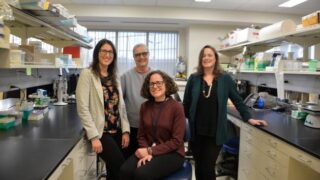Areas of Study
The hematopoietic system
Education
- University of Pennsylvania2006PhD
- Hobart and William Smith Colleges2000BS
Research
The focus of our lab is on understanding how the hematopoietic system responds to, and recovers from, hematologic stress caused by infection or inflammation.
The Basics: The hematopoietic system is maintained by the bone marrow, which produces billions of cells each day. Ultimately, it is the bone marrow-resident hematopoietic stem cell (HSC) that supports hematopoiesis throughout life, as it is able to self-renew, generating more stem cells, and produce more differentiated multipotent progenitors (MPPs). Under normal conditions, HSCs are maintained in a dormant state, and their daughter cells, the MPPs, are responsible for the daily production of lineage-specific cells (such as neutrophils and red blood cells). While a great deal is known about the mechanisms governing the generation of hematopoietic cells under homeostatic conditions, how these processes are altered by infection and inflammation are unclear. The process of “demand-adapted hematopoiesis” is likely important for generating cells necessary for combating infection, but may also contribute to pathogenesis by producing cells that augment inflammation. An important and open question is how acute and chronic inflammation impacts the function of the HSC and the progenitors (HSPCs) in the long term.
Using mouse models of infection, severe aplastic anemia, and aging we are investigating the cellular and molecular changes that occur to the hematopoietic system during stress-induced inflammation.
Impact of interferons on Hematopoiesis
The impact of type I IFNs (alpha and beta) in the activation of hematopoietic responses is being investigated in a severe, shock-like infection induced by infection with Ixodes ovatus ehrlichia (IOE) and in models of polymicrobial sepsis. IOE infection drives fulminant bone marrow failure , with a rapid and complete loss of HSCs and MPPs that depends on signaling through the IFN-alpha receptor. Type I IFNs drive both direct and indirect effects on HSCs during severe infection and both limit HSC proliferation and induce RIPK1-dependent cell death.
In collaboration with other laboratories in the Department and at the New York State Department of Health, we are exploring other infection models to better understand how clinically-relevant infections, including other tick-born diseases, induce both protective and pathologic changes in hematopoiesis.
Macrophages as Key Regulators of Hematopoiesis
Human monocytic ehrlichiosis (HME) is an emerging tick-borne disease caused by the pathogen Ehrlichia chaffeensis. HME patients exhibit severe anemia and thrombocytopenia. Our studies have revealed an important role for interferon gamma (IFNg)-signaling in the development of ehrlichia associated anemia, and IFNg is critical for the production of myeloid cells, in particular monocytes, during infection. IFNg was found to maintain resident macrophages in the marrow and these cells were necessary for the IFNg-dependent loss of HSCs during infection. Similarly, in a mouse model of severe aplastic anemia, macrophages play a central role in mediating the negative impacts of IFNg on the hematopoietic compartment.
Publications
View Katherine C. MacNamara's articles on the National Institute of Health's PubMed website.



